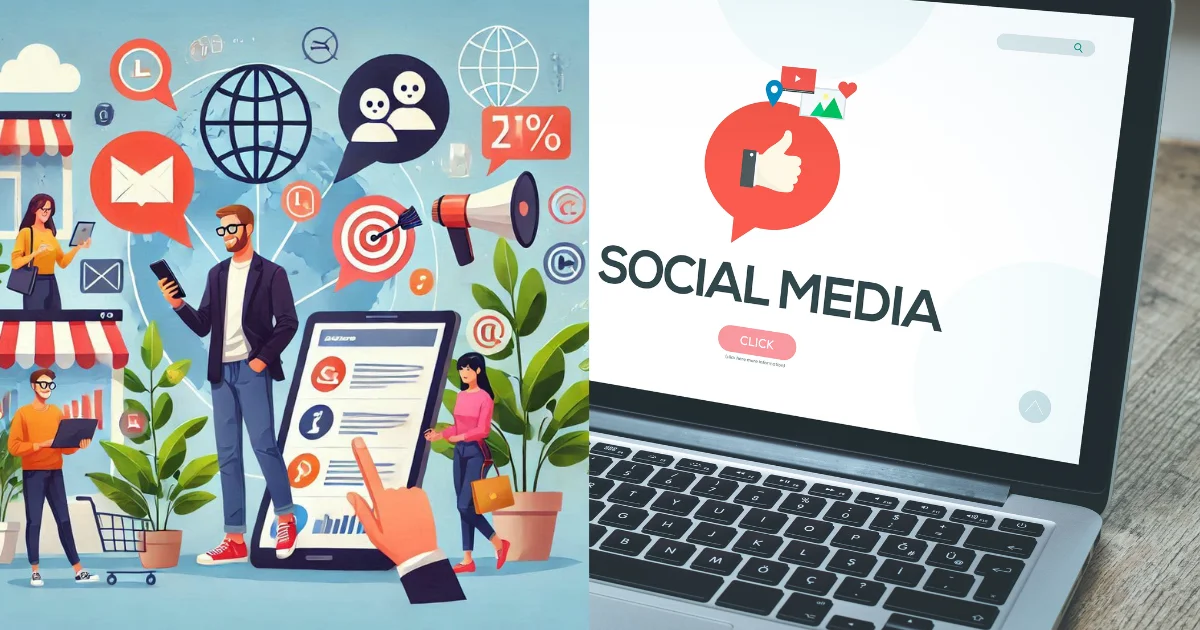In today’s digital world, social media marketing is a powerful approach to increase your company’s growth. Whether you’re in charge of a large corporation or a fledgling enterprise, leveraging social media platforms can contribute to the expansion of your organization. With smart social media marketing, businesses can easily connect with more people, grow their audiences, and measure their success.
1. Expanded brand recognition
One of the greatest advantages of social media marketing is the increase in brand awareness it can bring about. Social media platforms such as LinkedIn, Instagram, Twitter, and Facebook allow businesses to showcase their products and services to a global audience. By publishing often, creating engaging content, and running targeted ads, businesses may build a solid online presence.
For instance, a small clothing company can raise its profile with the help of social media marketing by showcasing its latest collections, interacting with potential customers, and encouraging shares and likes. If people recognize your brand, they are more likely to buy from you.
2. Reasonably priced advertising
When it comes to advertising your company, social media marketing is a reasonably affordable approach instead of a conventional one. Websites such as Facebook Ads and Instagram Ads let you create a budget fit for your means. Audience-targeting technologies help you guarantee that your material reaches the correct audience, thereby optimizing your return on investment (ROI).
For a weekend discount offer, for instance, a local café might target foodies within a particular geographic area using social media marketing. This accuracy in marketing guarantees that every dollar invested could create sales or leads.
3. More effective interaction with customers.
One of the most important aspects of successful social media marketing is actively engaging with your target audience. The use of social networks enables businesses to communicate directly with their clients using a direct channel of contact.
4. More people are visiting the website.
Using social media to sell your business is a fantastic way to get people to visit your website. You can get potential customers to learn more about your products by sharing links to your blog posts, product pages, or landing pages. Sharing content that gets hits and sales works especially well on sites like Pinterest and LinkedIn.
For example, a travel agent could use social media marketing to share beautiful pictures of faraway places with links to pages where people can book their trips. This approach not only brings more people to your website, but it also makes it more likely that those people will buy something.
5. Facts and figures
One of the best things about social media marketing is that it gives you access to data and information. Platforms like Instagram Insights, Facebook Analytics, and Twitter Analytics offer tools that help businesses learn about the likes, dislikes, behaviors, and engagement trends of their audience. These metrics will help you improve your marketing plan in a big way.
For example, a fitness teacher can look at which posts get the most comments and use that information to make more posts like that. You can get better results over time with social media marketing if you keep improving it.
6. Researching the Competition
Businesses can monitor their competitors through social media marketing. By observing their methods, content, and customer relationships, you can gain valuable insights into the successes and failures of your industry. This data can help you refine your strategy and maintain a competitive edge.
If an online retailer wants to know what’s trending on social media, it can look at what other companies are doing and use that knowledge in its own strategy. Using social media for marketing purposes both evens the playing field and gives you a leg up on the competition.
In conclusion
In today’s highly competitive environment, social media marketing is no longer a choice; rather, it is an absolute requirement for companies that want to expand their operations more rapidly. Improving brand exposure, driving traffic, engaging with customers, and improving revenue are all ways that social media marketing may serve as a catalyst for success. Social media marketing is no longer a choice; it’s a must for companies that want to grow faster in today’s market. Social media marketing is a success booster because it raises brand recognition, brings in more visitors, interacts with customers, and makes more sales.
Frequently Asked Questions about Social Media Marketing
1. What is social media marketing, and why is it important for businesses?
Social media marketing involves using social platforms like Facebook, Instagram, and LinkedIn to promote products or services. It is crucial for businesses because it increases brand visibility, drives website traffic, and enhances customer engagement.
2. How can small businesses benefit from social media marketing?
Small businesses can benefit by reaching a broader audience, building brand awareness, and using cost-effective advertising methods to generate leads and sales without exceeding their budget.
Which social media platform is best for my business?
The best platform depends on your target audience and industry. For visual content, Instagram and Pinterest are ideal. For professional networking, LinkedIn works best. Facebook and Twitter are versatile options for most businesses.
How can I measure the success of my social media marketing campaigns?
You can measure success using analytics tools provided by platforms, tracking metrics like engagement rate, website traffic, lead generation, and conversion rates.
How often should I post on social media to see results?
Posting frequency varies by platform and audience. However, consistency is key. Posting at least 3–5 times a week and analyzing engagement metrics will help you determine the optimal frequency for your business.
Expert Graphic Designer | Social Media Marketing Strategist | Content Writer
Specialize in impactful visuals, strategic social media campaigns, and SEO-optimized content.


